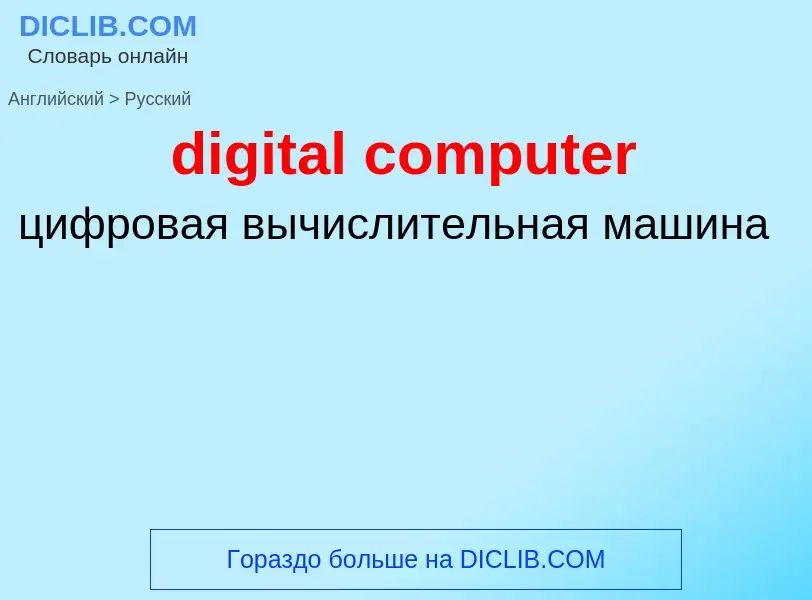Перевод и анализ слов искусственным интеллектом ChatGPT
На этой странице Вы можете получить подробный анализ слова или словосочетания, произведенный с помощью лучшей на сегодняшний день технологии искусственного интеллекта:
- как употребляется слово
- частота употребления
- используется оно чаще в устной или письменной речи
- варианты перевода слова
- примеры употребления (несколько фраз с переводом)
- этимология
digital computer - перевод на русский
общая лексика
цифровой компьютер
компьютер, работающий с числами, представленными в виде цифр. Термин используется в связи с терминами analog computer, hybrid computer
цифровая вычислительная машина
Определение
Википедия
.jpg?width=120)
A computer is a machine that can be programmed to carry out sequences of arithmetic or logical operations (computation) automatically. Modern digital electronic computers can perform generic sets of operations known as programs. These programs enable computers to perform a wide range of tasks. A computer system is a nominally complete computer that includes the hardware, operating system (main software), and peripheral equipment needed and used for full operation. This term may also refer to a group of computers that are linked and function together, such as a computer network or computer cluster.
A broad range of industrial and consumer products use computers as control systems. Simple special-purpose devices like microwave ovens and remote controls are included, as are factory devices like industrial robots and computer-aided design, as well as general-purpose devices like personal computers and mobile devices like smartphones. Computers power the Internet, which links billions of other computers and users.
Early computers were meant to be used only for calculations. Simple manual instruments like the abacus have aided people in doing calculations since ancient times. Early in the Industrial Revolution, some mechanical devices were built to automate long, tedious tasks, such as guiding patterns for looms. More sophisticated electrical machines did specialized analog calculations in the early 20th century. The first digital electronic calculating machines were developed during World War II. The first semiconductor transistors in the late 1940s were followed by the silicon-based MOSFET (MOS transistor) and monolithic integrated circuit chip technologies in the late 1950s, leading to the microprocessor and the microcomputer revolution in the 1970s. The speed, power and versatility of computers have been increasing dramatically ever since then, with transistor counts increasing at a rapid pace (as predicted by Moore's law), leading to the Digital Revolution during the late 20th to early 21st centuries.
Conventionally, a modern computer consists of at least one processing element, typically a central processing unit (CPU) in the form of a microprocessor, along with some type of computer memory, typically semiconductor memory chips. The processing element carries out arithmetic and logical operations, and a sequencing and control unit can change the order of operations in response to stored information. Peripheral devices include input devices (keyboards, mice, joystick, etc.), output devices (monitor screens, printers, etc.), and input/output devices that perform both functions (e.g., the 2000s-era touchscreen). Peripheral devices allow information to be retrieved from an external source and they enable the result of operations to be saved and retrieved.

.jpg?width=200)
![Sir William Thomson]]'s third tide-predicting machine design, 1879–81 Sir William Thomson]]'s third tide-predicting machine design, 1879–81](https://commons.wikimedia.org/wiki/Special:FilePath/099-tpm3-sk.jpg?width=200)
![算盘}}). The number represented on this [[abacus]] is 6,302,715,408. 算盘}}). The number represented on this [[abacus]] is 6,302,715,408.](https://commons.wikimedia.org/wiki/Special:FilePath/Abacus 6.png?width=200)

![[[Cray]] designed many supercomputers that used multiprocessing heavily. [[Cray]] designed many supercomputers that used multiprocessing heavily.](https://commons.wikimedia.org/wiki/Special:FilePath/Cray 2 Arts et Metiers dsc03940.jpg?width=200)
![Babbage's]] [[Difference engine]] Babbage's]] [[Difference engine]]](https://commons.wikimedia.org/wiki/Special:FilePath/Difference engine plate 1853.jpg?width=200)
![[[ENIAC]] was the first electronic, Turing-complete device, and performed ballistics trajectory calculations for the [[United States Army]]. [[ENIAC]] was the first electronic, Turing-complete device, and performed ballistics trajectory calculations for the [[United States Army]].](https://commons.wikimedia.org/wiki/Special:FilePath/Eniac.jpg?width=200)
![The actual first computer bug, a moth found trapped on a relay of the [[Harvard Mark II]] computer The actual first computer bug, a moth found trapped on a relay of the [[Harvard Mark II]] computer](https://commons.wikimedia.org/wiki/Special:FilePath/First Computer Bug, 1945.jpg?width=200)
![A 1970s [[punched card]] containing one line from a [[Fortran]] program. The card reads: "Z(1) = Y + W(1)" and is labeled "PROJ039" for identification purposes. A 1970s [[punched card]] containing one line from a [[Fortran]] program. The card reads: "Z(1) = Y + W(1)" and is labeled "PROJ039" for identification purposes.](https://commons.wikimedia.org/wiki/Special:FilePath/FortranCardPROJ039.agr.jpg?width=200)
![routes]] on the Internet routes]] on the Internet](https://commons.wikimedia.org/wiki/Special:FilePath/Internet map 1024.jpg?width=200)
.jpg?width=200)
![gate]] (G), body (B), source (S) and drain (D) terminals. The gate is separated from the body by an insulating layer (pink). gate]] (G), body (B), source (S) and drain (D) terminals. The gate is separated from the body by an insulating layer (pink).](https://commons.wikimedia.org/wiki/Special:FilePath/MOSFET Structure.png?width=200)
![memory cells]]). memory cells]]).](https://commons.wikimedia.org/wiki/Special:FilePath/Magnetic core.jpg?width=200)
![The [[Antikythera mechanism]], dating back to [[ancient Greece]] circa 150–100 BC, is an early [[analog computing]] device. The [[Antikythera mechanism]], dating back to [[ancient Greece]] circa 150–100 BC, is an early [[analog computing]] device.](https://commons.wikimedia.org/wiki/Special:FilePath/NAMA Machine d'Anticythère 1.jpg?width=200)
![Museum of Science and Industry]] in Manchester, England Museum of Science and Industry]] in Manchester, England](https://commons.wikimedia.org/wiki/Special:FilePath/SSEM Manchester museum.jpg?width=200)
![A section of the reconstructed [[Manchester Baby]], the first electronic [[stored-program computer]] A section of the reconstructed [[Manchester Baby]], the first electronic [[stored-program computer]]](https://commons.wikimedia.org/wiki/Special:FilePath/SSEM Manchester museum close up.jpg?width=200)
![A [[slide rule]] A [[slide rule]]](https://commons.wikimedia.org/wiki/Special:FilePath/Sliderule 2005.png?width=200)
![[[Bipolar junction transistor]] (BJT) [[Bipolar junction transistor]] (BJT)](https://commons.wikimedia.org/wiki/Special:FilePath/Transistor-die-KSY34.jpg?width=200)

